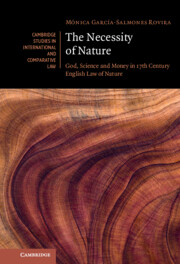(image source: CUP)
Book description:
To understand our current world crises, it is essential to study the origins of the systems and institutions we now take for granted. This book takes a novel approach to charting intellectual, scientific and philosophical histories alongside the development of the international legal order by studying the philosophy and theology of the Scientific Revolution and its impact on European natural law, political liberalism and political economy. Starting from analysis of the work of Thomas Hobbes, Robert Boyle and John Locke on natural law, the author incorporates a holistic approach that encompasses global legal matters beyond the foundational matters of treaties and diplomacy. The monograph promotes a sustainable transformation of international law in the context of related philosophy, history and theology. Tackling issues such as nature, money, necessities, human nature, secularism and epistemology, which underlie natural lawyers' thinking, Associate Professor García-Salmones explains their enduring relevance for international legal studies today.
On the author:
Mónica García-Salmones Rovira is Global Law Fellow in the Alvaro d'Ors Global Law Chair, ICS, at the University of Navarre, and a Senior Fellow at the Erik Castrén Institute of International Law, University of Helsinki. She is the author of The Project of Positivism in International Law (2013) and co-editor of Cosmopolitanisms in Enlightenment Europe and Beyond (2013) and International Law and Religion (2017).
Table of contents:
Table of Contents:IntroductionI Altering the Perception of NatureII Nature and The Light of NatureIII Needs, Politics and MoneyIV Necessity and LiberalismIV Outline of Chapters
- 1. A Christian Science: Searching for the Common Good and the Public Good
1.1 Deism, Neoplatonism and the Light of Reason1.2 Scepticism and Moral Righteousness1.3 Hobbes and Locke versus Filmer on Political Economy1.4 The New Oeconomies: Household – State – Nature
- 2. Hobbes's Doctrine of Necessity
2.1 Hobbes's Doctrine of Necessity and Existence2.2 Necessitarian Metaphysics and (Human) Body in Avicenna and Hobbes
- 3. Necessities, Natural Rights and Sovereignty in Leviathan
3.1 Hobbes's Necessity, Theology and Natural Laws3.2 The Doctrine of Necessity in Leviathan
- 4. Reformers on the Necessary Knowledge
4.1 Useful Knowledge as the Only Necessary Knowledge: Benjamin Worsley in Context4.2 All-Encompassing Human Necessities
- 5. Necessity, Free Will and Conscience: Robert Sanderson
5.1 Logician and Theologian5.2 The Mechanical Conscience
- 6. The Grand Business of Nature
6.1 The Oeconomy of Nature6.2 The Fact of Man6.3 The Grand Business of Nature
- 7. Robert Boyle, the Empire over Nature
7.1 Nothing Is Necessary: Benjamin Worsley Revisited7.2 The Transmutator of Nature7.3 Undoing Nature
- 8. Locke's Early Writings
8.1 Independent Judgment of Conscience, Public Order and Public Interest8.2 Undoing Conscience
- 9. Medicine, Oeconomy and Needs
9.1 The Oeconomy of Needs9.2 Physicians and Oeconomia
- 10. Money and the Doctrine of Necessities
10.1 Locke's Doctrine of Necessities10.2 Usury, Interest and Science
- 11. The Scientification of Money
11.1 The Science of Interest11.2 The Morality of Capital
- 12. The Doctrine of Necessities and the (Public) Good
12.1 Necessity and Necessities in Knowledge and Morality: An Essay Concerning Human Understanding12.2 Necessities, Dominion and Money in the Two Treatises of Government
- Conclusions
(source: ESIL IGHIL)
More information with CUP.


No comments:
Post a Comment